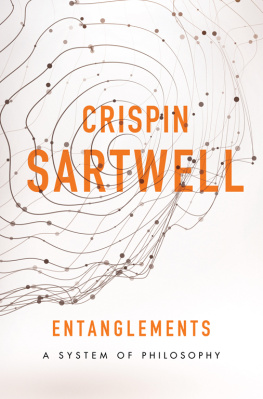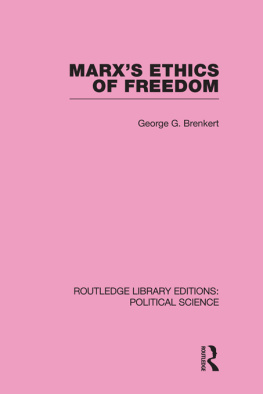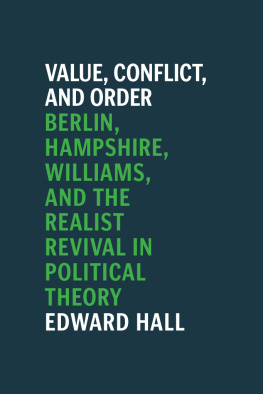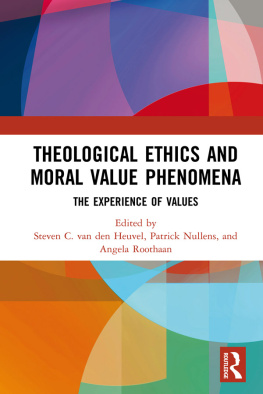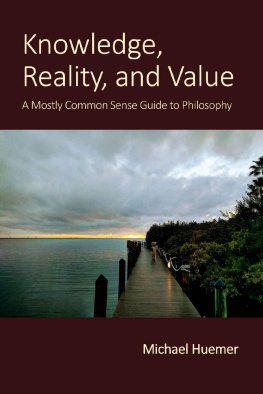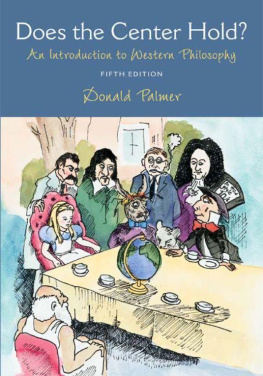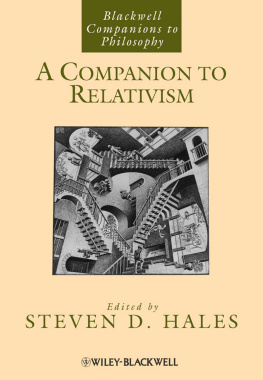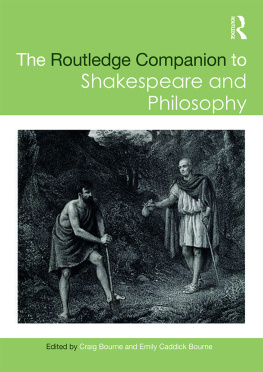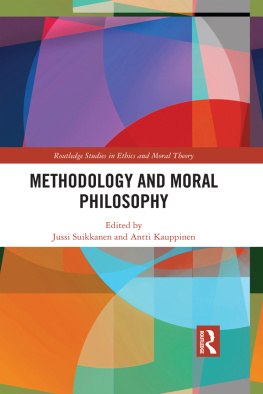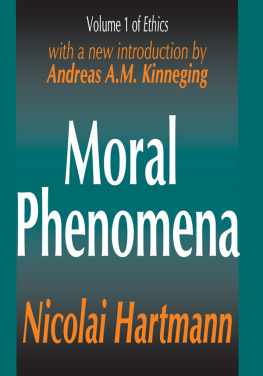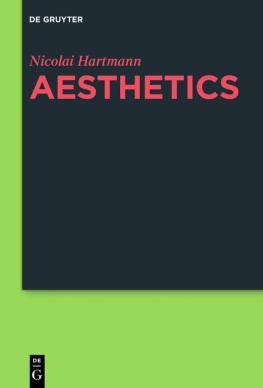SUNY SERIES IN A MERICAN P HILOSOPHY AND C ULTURAL T HOUGHT
Randall E. Auxier and John R. Shook, editors
Published by
S TATE U NIVERSITY OF N EW Y ORK P RESS , A LBANY
2017 State University of New York
All rights reserved
Printed in the United States of America
No part of this book may be used or reproduced in any manner whatsoever without written permission. No part of this book may be stored in a retrieval system or transmitted in any form or by any means including electronic, electrostatic, magnetic tape, mechanical, photocopying, recording, or otherwise without the prior permission in writing of the publisher.
For information, contact
S TATE U NIVERSITY OF N EW Y ORK P RESS , A LBANY , NY
www.sunypress.edu
Production, Laurie D. Searl
Marketing, Anne M. Valentine
Library of Congress Cataloging-in-Publication Data
Names: Sartwell, Crispin, 1958 author.
Title: Entanglements : a system of philosophy / Crispin Sartwell.
Description: Albany, NY : State University of New York, 2017. | Series: SUNY series in American philosophy and cultural thought | Includes bibliographical references and index.
Identifiers: LCCN 2016031446 (print) | LCCN 2017000564 (ebook) | ISBN 9781438463872 (hardcover : alk. paper) | ISBN 9781438463896 (e-book)
Subjects: LCSH: Philosophy, American. | Philosophy, Modern.
Classification: LCC B851 .S27 2017 (print) | LCC B851 (ebook) | DDC 191dc23
LC record available at https://lccn.loc.gov/2016031446
10 9 8 7 6 5 4 3 2 1
What we know is a point to what we do not know. The first questions are still to be asked. Let any man bestow a thought on himself, how he came hither, and whither he tends, and he will find that all literature, all the philosophy that is on record, have done little to dull the edge of inquiry.
R ALPH W ALDO E MERSON
No ideas but in things.
W ILLIAM C ARLOS W ILLIAMS
Contents
P ART I
First Philosophy: Reality, Truth, and Knowledge
I NTRODUCTION
The Universe in Brief

Heres how to think about the universe. Its a skein, fabric, orbettertangle, like rough twine tied and twisted together back and forth in snarls. Its a mess, not a grid. There are many strings, or perhaps there is a single string, forming something like a fabric at a distance, consisting of myriad knots closer up. Each knot is an individual and each individual a knot; it has a distinct form and location and physical composition. Each knot consists, without remainder, of string connecting it to other nodes of the skein; each individual is itself only as and in relation. Different points of view on the skein produce different perspectives, so that at a wider angle larger structures emerge; nevertheless, the skein itself does not depend from any point of view, interpretation, or description, though such things as these are actually themselves part of the skein. The tangle is continually being deformed, as though one person were holding it on each side and each was performing a random set of up-and-down and side-to-side motions, so knots keep coming undone, new tangles emerge, and so on. And the whole thing is fraying and disintegrating.
Its true that the fabric of reality is an old saw or the merest clich; you keep running into it everywhere, from Confucius to the Greeks to the latest popularization of string theory or what I am calling knot theory: the theory of entanglements; universe as macram or crochet. From one point of view, the fact that I am harping on a clich is a drawback. From another, it suggests that weve latched on to some fundamental insight. It would not be surprising if the true nature of the universe were surprising. But it would not be surprising if the true nature of the universe were not surprising; maybe its something were fundamentally acquainted with every day. On the other hand, a lot of metaphors might be worth playing with, and youre always trying to decide what is and what is not a mere metaphor.
With regard to the science or everyday experience of the knotscape, we could pick out indefinitely many structures or introduce various ontological ordering principles for various purposes: taxonomies of knots or of subknot elements that show the structure of particular knots (precisely the function of skein analysis in knot theory) or a table of elements. In some sense, what counts as a knot has to be fixed and is a question: the question of whether that tangle is a single knot or a stack of knots or not even a knot always implicates a particular standpoint that is being taken up, or the rough conventional ontology. You could pick out indefinitely many structures or introduce various ontological ordering principles for various purposes. But for a given claim to be true, the skein has really to be as the claim says it is. There are multiple correct systems of representation of the skein, but there are also incorrect ones. And though the system by which knots are individuated can yield to convention and circumstance, there are often perfectly definite answers to questions within such a system: no, that one cant be part of that one.
The way we order the array into individuals is not whimsical or merely conventional, however. Indeed, if we did not order our experience of the world more or less the way the world actually is, we would long ago have been extinguished. We order the world from within the world, as part of the world. If we didnt distinguish lions from various portions of their and our shared environment, wed merely be prey. Nevertheless, of course, the body of the lion or the human being is not fully distinct from its surroundings, and as the lion is breathing, seeing, smelling, eating, excreting, growing, aging, it is in interchange. We are actual creatures functioning in an actual environment; we are, of necessity, continuously responsive to actual features of it in their emergence through us. We have to mirror reality, we might say, but I see attention and perception as much more intimate than that, as an actual taking-in of external objects: perception and description are entanglements, in which the knot that is oneself gets snagged on something or snarled up in a different order.
Though I hope that many of the positions advocated in this book are radical or at least provocative, I take a classical approach to the matter of what philosophy is. As I understand it, philosophy is concerned with questions about ultimate values, each of which stands at the apex of a dimension of value: truth, knowledge, goodness, justice, and beauty. And as the above passage suggests, I take philosophy also to be concerned with characterizing or describing the world at the most general or fundamental level (the traditional task of metaphysics or the question of truth). I talk about these matters directly here, or at least I intend to. The goal is not a factual characterization of the worlds ultimate constituents or figuring out what are the basic subatomic particles, for instance (though a true metaphysics must be consistent with accurate scientific theories), but the aesthetic project of creating a picture of what there is and how it all hangs together, in all senses of hang.
That is, I regard philosophy as, among other things, the collection of its subdisciplines, including metaphysics, logic, epistemology, ethics, aesthetics, and political philosophy. Mine, we might sayor you might sayis a painfully reactionary conception of the field; I love the traditional philosophical questions, actually. Now the idea of philosophy as the attempt to characterize the ultimate nature of reality, truth, goodness, beauty, and so on sounds both woolly and grandiose, and it is. Many people, including many philosophers, would reject or have actually rejected such a project as ill-defined, impossible, or without use or results and any particular realization of it as unjustifiable, rationally arbitrary, and purposeless. These are serious objections.

